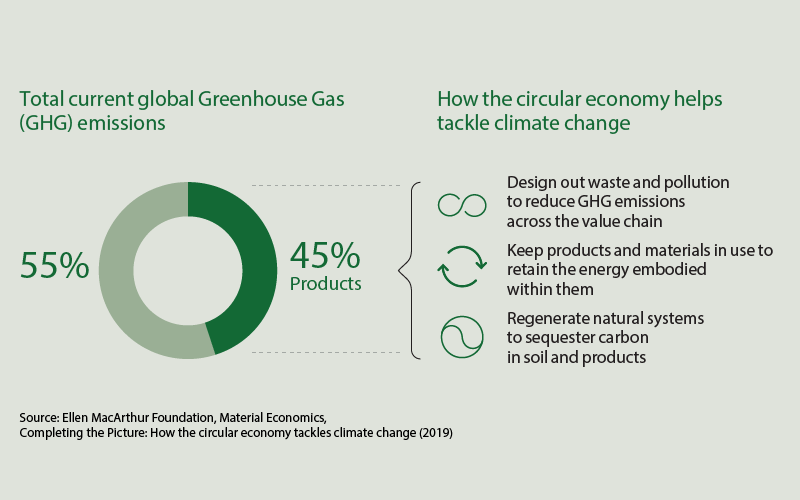
Jocelyn Bleriot
Executive Lead Institutions, Governments,
& Cities, Ellen MacArthur Foundation
Our economy is linear — we extract raw materials and turn them into products, which eventually get thrown away. Recycling and efficiency measures are welcome, but they don’t change this logic — they only slow things down. Ultimately, the materials in our economy have a one-way journey to landfills, incinerators, or to become pollution in the environment.
This ‘take, make, waste’ linear economy, which relies on creating value mostly by depleting finite resources, cannot work in the long term and is fuelling the greatest global challenges facing us today, including the twin crises of climate change and biodiversity loss.
The transition to a circular economy is an innovation and competitiveness agenda that requires collaboration from all stakeholders.
The circular economy, by contrast, builds economic and natural capital. It eliminates waste and pollution, keeps products and materials in use, and regenerates natural systems. It gives us the option to grow prosperity, jobs, and resilience while reducing greenhouse gas emissions, waste, and pollution. A repair cafe that helps you fix your phone, to a more durably-designed T-shirt whose materials can be repurposed, a building that’s designed for disassembly, or packaging that’s grown rather than made — these are examples of what makes up the circular economy.
The transition to a circular economy is an innovation and competitiveness agenda that requires collaboration from all stakeholders. Designing for a circular economy is one of the great creative opportunities of our time, and it doesn’t stop at the product level — it’s systemic and compels us to think in terms of materials, processes, and business models.

The circular economy has garnered significant momentum in Canada. At the federal level, the Canadian government is hosting the 2021 edition of the landmark circular economy event of the year, the World Circular Economy Forum.
This gathering will see the launch of a report authored by the Council of Canadian Academies, commissioned by Environment and Climate Change Canada, to examine the potential of a transition to a circular economy for the country.
At the provincial level, Quebec created a circular economy platform in 2018 and saw recently saw the inauguration of the Center for Intersectoral Studies and Research on the Circular Economy (CERIEC), a circular economy research centre with an initial $2.1 million of private funding. In February, the Quebec Research Fund announced a $5 million budget for the establishment of a provincial research network on the circular economy. By highlighting the economic rationale of a circular economy, identifying challenges and opportunities, and coordinating efforts, the province is taking a pioneering role in the transition in Canada.
At the city level, Toronto has an aspiration to become zero-waste and to be Ontario’s first city with a circular economy. Through the city’s Circular Economy and Innovation unit, Toronto is working to incorporate circular economy principles in its procurement processes and through various projects.
Progress isn’t limited to the public sector. In the plastics industry, the recently-launched Canada Plastics Pact brings together more than 50 organizations — including businesses from across the Canadian plastics value chain, alongside government institutions and NGOs — all working towards a common vision for a circular economy for plastic in Canada.
Through collaboration of the public and private sector, the enabling conditions can be built for circular innovation to thrive and scale, allowing Canada, its provinces, and its territories to find a path to better growth, benefiting its people, businesses, and environment.



